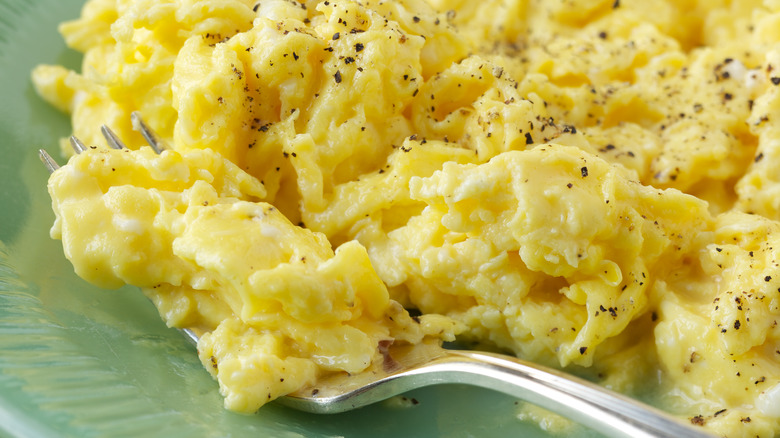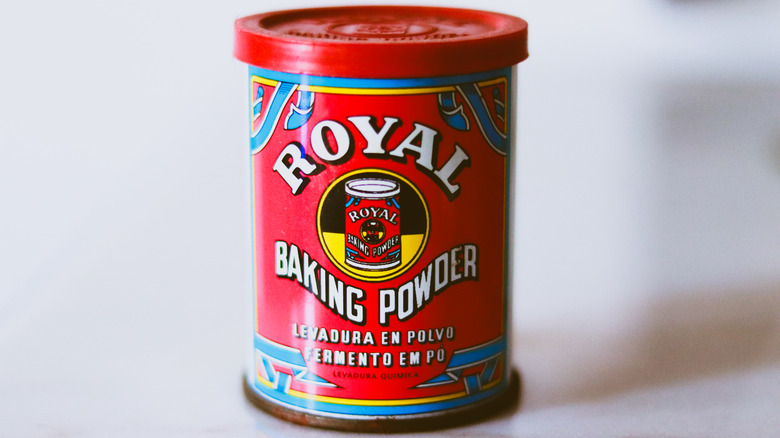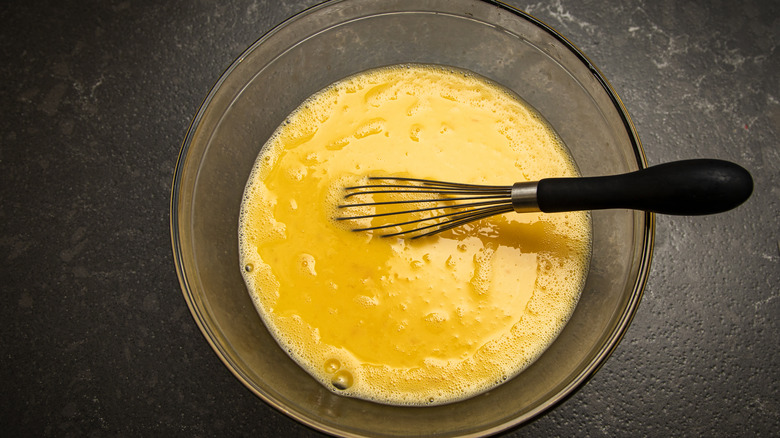Baking Powder Is The Secret To Perfect Scrambled Eggs
Scrambled eggs check all the right boxes for breakfast. They're simple and satisfying, they don't require a lot of ingredients, and almost anyone can learn how to make them. Whether they're piled high on a breakfast buffet, or you're mixing up a skillet for a lazy Sunday brunch, all you need is a couple of fresh eggs and a little butter or oil to get the day started.
What most people think is the best way to make scrambled eggs does have room for improvement. Chances are, they could be fluffier. If you like your scrambled eggs super fluffy, all you need to do is take a cue from another all-star breakfast item, pancakes, and add a little baking powder. Baking powder is a leavening agent, which is a powdered, edible chemical mixture that creates bubbles in liquid. When it comes in contact with your egg mixture and some heat, it makes the same culinary magic as it would in a cake batter. Just be sure only to use a tiny bit of baking powder. A little goes a long way — too much can change the taste of your eggs, and not in a good way.
How baking powder fluffs up eggs
Typically we think about baking powder when it's time to bake a cake, cookies, or muffins. That's because it's almost exclusively used to make the batter light and fluffy. It's a mixture of cornstarch (or a similar filler), sodium bicarbonate (baking soda), and some sort of acid (like cream of tartar). When you combine baking powder with any liquid and heat, a chemical reaction happens, which releases carbon dioxide. In batter, like one made from a banana bread recipe, those bubbles create the tiny gas pockets that make the mixture rise and solidify around them. When you add baking powder to eggs, the same thing happens. The powder is activated by the liquid in the eggs, and when you heat them in the pan it creates carbon dioxide bubbles.
There is a drawback to using baking powder in scrambled eggs, however. Baking powder can add an acrid, salty, or chemical flavor to your eggs if you use too much, so only use a tiny amount — ⅛ of a teaspoon for every two eggs.
Don't use baking soda
If you're feeling hesitant about how baking powder will transform your eggs, it's easy to experiment with a single egg. Simply crack an egg, add a tiny pinch of baking powder to it, and then whisk everything together and cook the mixture in a hot pan. Once your scrambled eggs are cooked, give them a taste. If you've used just enough baking powder — but not too much — you should only taste light, fluffy eggs, and no unwanted aftertaste.
If you don't have baking powder on hand, don't reach for the baking soda. (Don't worry if you don't know the difference between baking powder and baking soda.) Baking powder contains acid, which is needed to make it work in this instance. Eggs don't have much natural acidity, so while baking soda might make your eggs a little fluffier, it also won't completely dissolve and react — so you'll run the risk of creating an unpleasant, residual chemical flavor. It's best to stick to baking powder for the fluffiest scrambled eggs, that still taste great.


